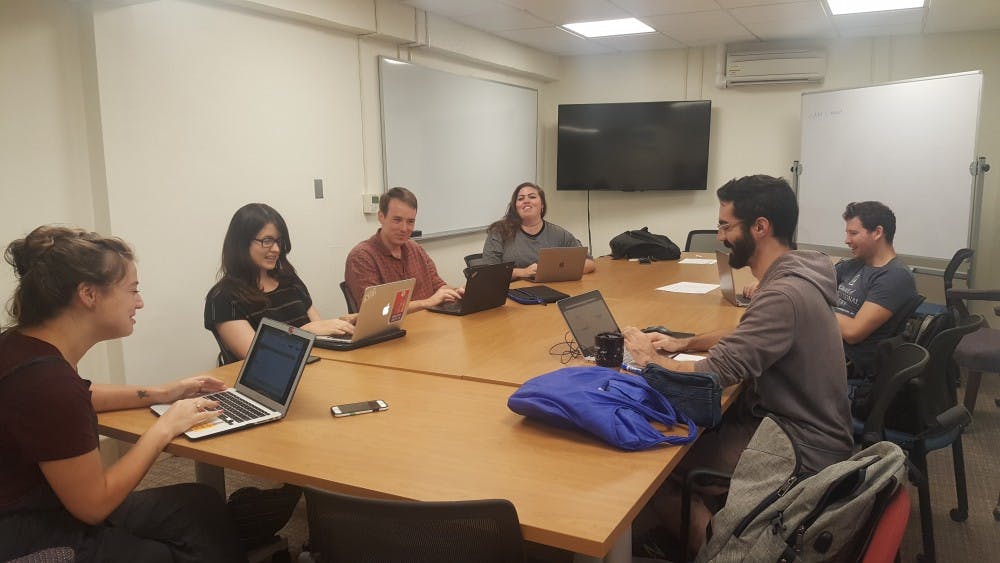The graduate student union at American University formed to create better working conditions for graduate student workers, with the goals of improving pay, access to student health services and reducing fees, among other things.
Unionization efforts began in the fall of 2016, when AU graduate students came together to begin the process of forming a union to solidify their rights. Stephan Lefebvre, a PhD candidate for economics and a fourth year graduate student, got involved in the union during the organization phase.
“To form a union, you need to submit signatures to the National Labor Relations Board of at least 30 percent of the proposed unit, and the unit that we were going for was graduate student workers who are on fellowship,” Lefebvre said.
The process included going up to graduate student workers and asking them about their experiences on campus, Lefebvre said, and through those conversations, he and other workers were informed on issues that they were not aware of and spread the word of their unionization efforts to other workers who would be interested.
Once the signatures were submitted, NLRB had an election to vote on forming a union, and the graduate students won by a margin of five to one, with “overwhelming support,” Lefebvre said.
The union began negotiating a contract in the summer 2017 and non-economic issues were brought to the table first, including issues such as access to materials, evaluations and discipline dismissal, Lefebvre said.
However, the union fought particularly hard on the economic issues like stipends and health care.
“We fought really hard and in some ways, we asked for the sun, the moon and the stars,” Lefebvre said. “We had a vision for a living wage on campus and five years of fellowship instead of just four, and all of the things that we did not succeed with the first contract we hope we can do in future ones because none of these things are unheard of.”
Lefebvre said that negotiating a contract was a constant back and forth between the workers and the AU administration, and “it was both adversarial but also really collaborative.” The contract ended up being a “big improvement” from what existed before in terms of securing pay raises for Kogod students and Dean’s Fellows at the Washington College of Law.
Elissa Cohen, a graduate student who joined the union once negotiations began, emphasized that this contract was only the beginning.
“The first thing we need to remember is that this is our first contract, and a lot of what we have going forward is the ability to build on what we have already done,” Cohen said. “What I’ve learned from this process is that the hardest thing to do is getting the first contract.”
The University referred The Eagle’s request for comment to William LeoGrande, a professor in SPA involved in the contract negotiations, who said that the negotiation process was very “collegial and constructive.”
“This negotiation was complex because the graduate students have two very different roles—as students and as employees—and we had to be sure the collective bargaining agreement did not compromise their status as students,” LeoGrande said. “In the end, I think we accomplished that to the satisfaction of both the university and the union.”
The current contract is only a seven month contract because the union wanted to get on the same budgeting cycle as the University, Lefebvre said. In the next negotiation, he said that things will not change drastically, but one of the biggest issues that needs to be addressed is student health care.
“Issues like this, the University often says that it’s not their problem,” Lefebvre said. “With student health insurance, because it’s so limited, because you need referrals to see an outside provider, it’s remarkably easy to end up with a $10,000 bill.”
The limitations within student health care directly affect graduate student workers’ abilities to be a student along with being a resident assistant or teaching assistant, and Lefebvre hopes that this will be included in the next contract.
“When AU prioritizes something, they put resources behind it and it becomes the strength of the school,” Lefebvre said. “I’m hopeful that the University is turning around and realizing the benefits of this collaboration between them as employers and us as workers.”
Ultimately, Cohen said that forming a union benefits not only graduate students, but the University as a whole.
“It sends a clear message to the University and to the general student body and faculty that graduate workers are united in improving their conditions, but also that they’re committed to the well-being of the University,” Cohen said. “We play an integral role in many of the functions of the University and if we can’t do well, then the whole body can’t do well.”
asheffey@theeagleonline.com




